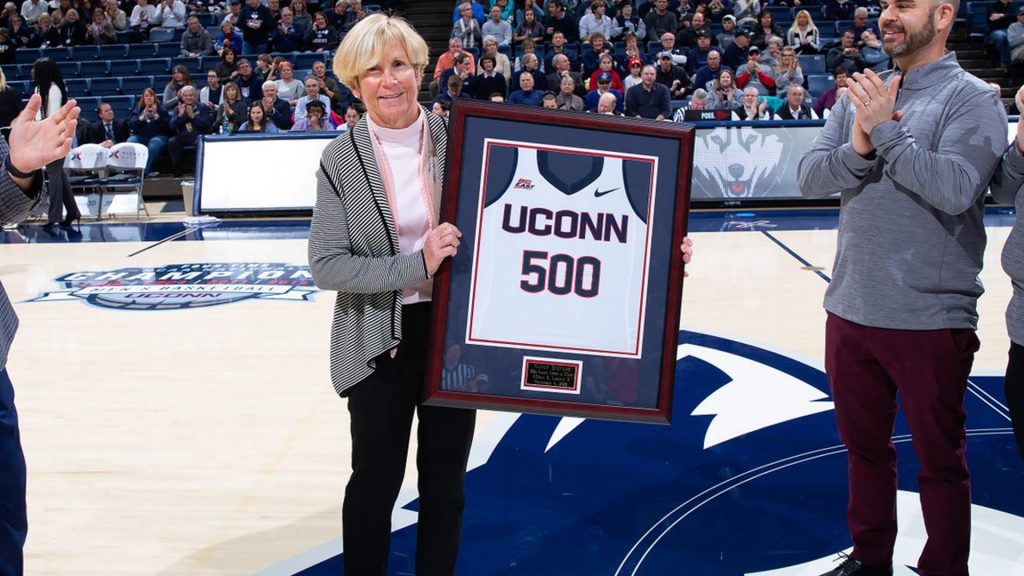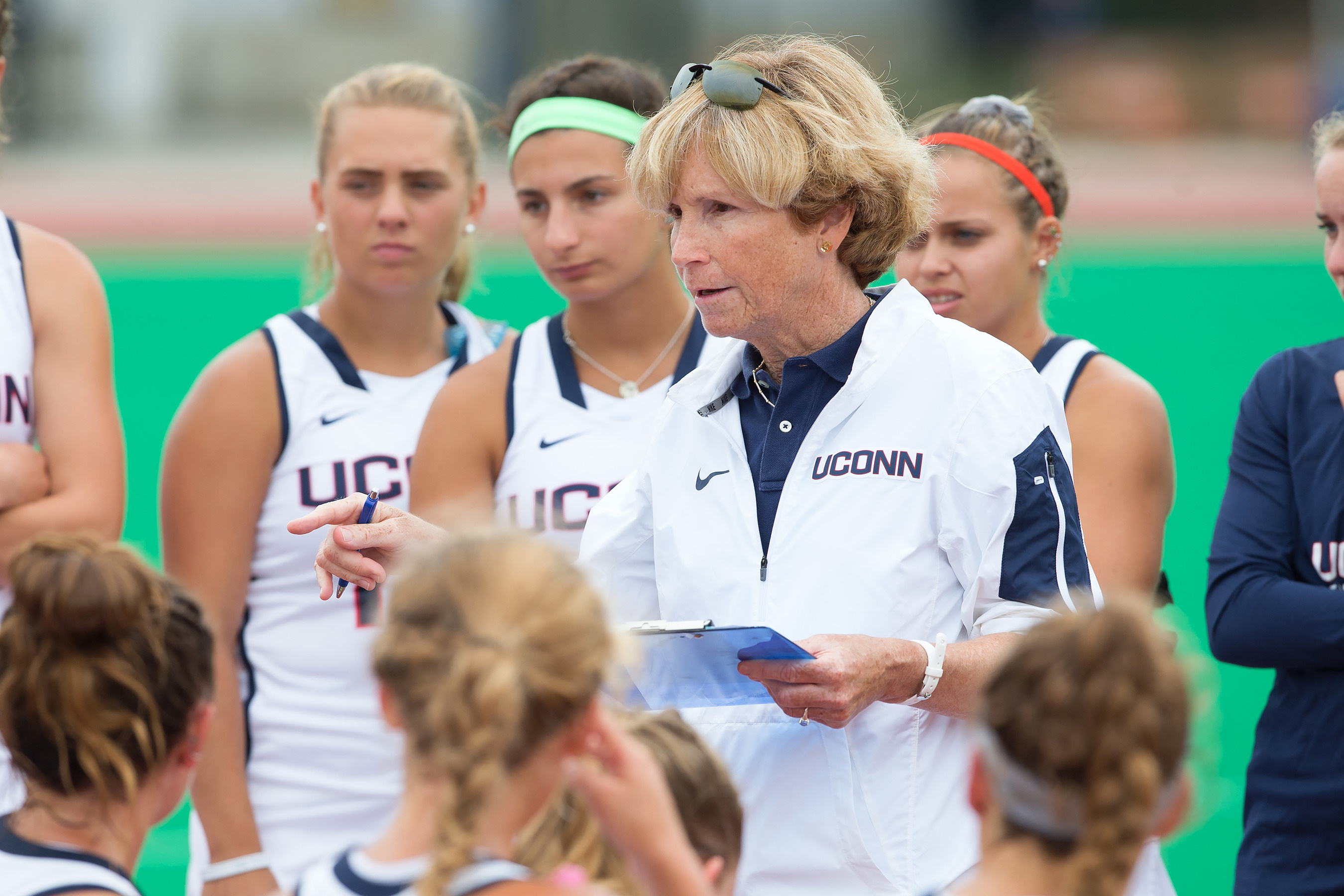Hall of Fame field hockey coach Nancy Stevens, the winningest coach in NCAA field hockey history and leader of the UConn field hockey program for the past 30 seasons, announced her retirement as head coach of the Huskies, effective Sept. 1.
Stevens’ long-time assistant coach, Paul Caddy, has been named as her successor, and Stevens will remain involved with the program as a volunteer assistant coach.
Her achievements are enough to fill several record books: Stevens led the Huskies to three National Championships (2013, 2014, and 2017) and helped revive a program to elite status in Division I field hockey. Under Steven’s tutelage, the Huskies reached the last 17 NCAA Tournaments and advanced to 10-consecutive NCAA Quarterfinals. Stevens finishes her career with an all-time record of 700-189-24, and is the only coach in the history of the sport to reach the 700-win plateau. Under her guidance, the Huskies appeared in 24 NCAA Tournaments, reached 18 NCAA Quarterfinals, 10 NCAA Semifinals, won 19 Big East Tournament titles and 19 Big East regular season titles while producing 50 First Team All-Americans. Stevens led the Huskies to a No. 1 national ranking in five different years (2018, 2017, 2016, 2015, and 1999).
Before arriving in Storrs, Stevens coached at Northwestern, Penn State, and Franklin & Marshall. She also coached lacrosse at both Penn State and Franklin & Marshall. She captained the 1975 field hockey team at West Chester University that won the AIAW National Championship and was a member of the U.S. National Team from 1974-79. She competed in the 1975 World Championships in Edinburgh, Scotland on the U.S. team captained by former UConn coach Diane Wright, her teammate at West Chester University.
Coach Stevens talked with UConn Today about her remarkable career:
What led you to the decision to announce your retirement now?
I had two really exciting trips planned. I was going to take my seventh horseback safari in Africa, my fifth trip to Botswana in particular, and that was canceled. I was going to do some glacier hiking and ride the Icelandic course in Iceland and that was canceled. You begin to realize that as much as you’d like, you really don’t have an unlimited amount of time to do all the things that you want to do; then you think about the things you like doing. I like to do adventure travel and be very active; I like working out a couple of times a day. I’m probably not going to do that when I’m 80. We would like to think that we’re going to be in excellent health and live to be a hundred; that’s probably not that realistic. Father Time is undefeated. I always tell my team that I make decisions through the prism of mathematics.
When you think about all that you have accomplished, what stands out in your mind?
For good or for bad, most coaches want to win national championships. If you’re at a school where you can do that and it’s been done in other programs, that’s always the benchmark. We needed to get there. Having won a national championship as a college player and knowing how that’s an empowerment that really impacted a lot of my life, it does empower you to believe that you can achieve almost anything. We always want that for our players. For me, championships are so affirming because they just make young people feel they can accomplish anything. The trophy itself is not that significant. I wanted that accomplishment to be a springboard for our players and our coaching staff. That’s why I think they’re important. The bond that you have with your players and that they have with each other are strengthened when you’re able to compete at the highest level. Beyond that, it’s the relationships with our players. I was able to hear from players I coached in 1978 and 1979 at my first stop and Franklin & Marshall College, and I heard from players that I coached at Northwestern for nine years and, of course, from the players that I’ve coached at UConn for the last 30 years. Those enduring relationships, I think, are what mean the most to coaches. That’s why we’ve chosen it as our career; the remarkable young women that we’ve coached and that have enriched our lives.

Legacy is a major factor for teams and for coaches. What does it mean to you that you are now going to be the standard for all of your players?
When I arrived we had a grass field when Division I field hockey moved to AstroTurf. I was told we would have our AstroTurf field within about a year, but it took five. Once we got that facility through the generosity of the Sherman family [The George J. Sherman Family Sports Complex], we started to take off and we could compete with the best. Every time we’ve been to the Final Four we’ve had to go through a Big 10 team or an ACC team. As we know, they have a unlimited resources, palatial facilities, they have the best coaching staff that money can buy. We’re really proud of the three championships that we have because we’ve had to go through the Big 10 and ACC teams to get them. I think it’s even going to become more challenging in the years ahead because those conferences are finding ways to separate themselves from all the other conferences because of the resources that they have. That being said, we have such a strong brand and our location is ideal, right in the hot bed of Connecticut, Pennsylvania, New Jersey, New York, Massachusetts and our surrounding states that have the best hockey in the country. We have those factors going for us and also we have a terrific university. The changes over the past 30 years since I’ve been here have been nothing short of astounding. The physical plant, the multiple billion-dollar infrastructure improvements and the University has just really been an amazing transformation. All these things help us to compete with those conferences and the final piece, of course, is we still have Paul and Cheri and they have been an incredibly important part of our three national championships. I feel really good about our future.
While almost all coaches have played the sport they lead, outstanding players often do not become successful coaches. You, Paul, and goalkeeper coach Cheri Schulz all were highly accomplished players. You have a master’s degree in sports psychology, which is also a rarity, but is an important part of what a coach does. How has all of this factored into your success?
Tactical brilliance is important but what I think we’re trying to do is also have emotional intelligence. Cheri, Paul, and I worked hard to have really strong and productive relationships with the players. Managing teams to have success is going to be in large part due to working with people. I think that we’ve worked really hard on trying to get better and better each year on how we relate to our players and how they relate to each other. The other thing we do is a lot of teambuilding work. Sometimes it’s hard work, with interpersonal relationships to have the team function coherently and to be open and affirming over people’s differences and understanding that diversity is a strength. Although we want to play with one heartbeat, we certainly don’t everyone to be the same nor expect them to be the same. That also brings me to another aspect of our program. For a long time we’ve embraced the international player as the real story of diversity in our program and bringing fresh, new ideas. Paul, Cheri, and I really work hard on not having an ego. We had an Olympian two years ago, Ceclie Pieper ’18 EDU from Germany, and she was the only Olympic medalist that we had in our program. She was a Bronze medalist in Rio de Janeiro. Well, we asked her for a lot of ideas. Maybe some coaches would be defensive because they would think that the people think they know what they’re doing. We have reached out to not just the international players, but our domestic players to bring ideas to the team and we’ll try their ideas. We’ll try different set pieces that they have brought to us from their club coaches. I think part of our success is always searching for new ways to do things. We value the opinions of our players and embrace that. My philosophy comes from [former Chicago Bulls and Los Angeles Laker coach] Phil Jackson’s book, “Sacred Hoops,” where everyone’s in a circle and you can step forward. Freshmen through seniors, coaches can step forward and make an impact as opposed to being a hierarchy like the old football model, where like [former University of Michigan head football coach] Bo Schembechler was maybe one step below God, then a layer of assistant coaches and then the senior players, juniors, sophomores and there’s freshman at the bottom of the pyramid. That’s just not how we have it.
Last year, 20 of your players were named to the Big East Academic Team; that’s almost the entire team roster. This has been the case for a long time with players majoring in studies like biomedical engineering, nursing, kinesiology, and other complex subjects. For example, Amy Herz ’00 CLAS is an orthopedic surgeon and Kim Krzyk ’11 CLAS is a pediatrician. How do such top students factor into a team’s success on the field?
Yeah, that’s part of the magic too. We’re really fortunate because when you have a university like UConn that has really outstanding academic programs, you can attract the best student athletes. We’re recruiting against Duke, they have a great field hockey program and we met them in the final in 2013. We’re recruiting against Princeton, who won a national championship and went to the finals this year. We’re recruiting against some of the top academic schools in the country. Our honors program has allowed us to be able to compete for those student athletes. It’s really fun to coach bright kids. We’ve been lucky to be able to attract them here and the reason we have is because we have a great university.
What should people know about your success that you haven’t been asked?
I really think a lot of the success comes from having balance in your life. We need to work hard, but we also need to enrich our lives by travel, seeing different cultures, and try to find things that you can bring back that are really going to inform your life. I think my trips to different countries in Africa, eight so far, has really changed my life. Doing things that are high risk for me: horseback safari – I’ve been charged by elephants, lions, and leopards while I’ve been on a horse — and doing things like that. Then, when you’re in overtime against North Carolina, it doesn’t seem like that big a deal.



